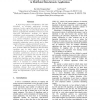169 search results - page 6 / 34 » New Challenges of Parallel Job Scheduling |
IPPS
2005
IEEE
14 years 4 months ago
2005
IEEE
High-end parallel systems present a tremendous research challenge on how to best allocate their resources to match dynamic workload characteristics and user habits that are often ...
HPDC
2002
IEEE
14 years 3 months ago
2002
IEEE
In high energy physics, bioinformatics, and other disciplines, we encounter applications involving numerous, loosely coupled jobs that both access and generate large data sets. So...
JSSPP
2000
Springer
14 years 1 months ago
2000
Springer
Abstract. Buffered coscheduling is a new methodology that can substantially increase resource utilization, improve response time, and simplify the development of the run-time suppo...
HPDC
1996
IEEE
14 years 2 months ago
1996
IEEE
In this paper a model for scheduling in wide-area systems is described. The model is federated and utilizes a collection of local site schedulers that control the use of their res...
IPPS
2000
IEEE
14 years 2 months ago
2000
IEEE
As communication and I/O traffic increase on the interconnection network of high-performance systems, network contention becomes a critical problem drastically reducing performan...


